| Lucas Hardwick |

Indiana Jones and the Last Crusade plays at the Trylon Cinema from Sunday, July 13th, through Tuesday, July 15th. For tickets, showtimes, and other series information, visit trylon.org.
***Only the penitent man will admit to and apologize for the spoilers ahead.***
The condition of the nine-year-old boy is a defining time for a kid, let alone an entire generation from that point forward. Teetering on the precipice of adolescence, still too young to be confounded by the mysteries of the opposite sex that will consume them for, oh, pretty much the rest of their lives, yet old enough to begin to feel the reluctant draw to put away childish things, the nine-year-old boy is the liminal bulwark into manhood. It’s a time of being accosted with expectations and reminded that the fun is about to be over, or at the very least become way more complicated, and that there are gonna be some real opportunities to screw up your life ahead, so hang on, buddy.
The bittersweet waning of past interests paw at you as you move into a more adventurous lifestyle. People start saying stuff to you like, “You’re old enough to know better” and “I’m really disappointed in you.” The time for forgiveness is over, and the juggernaut of relentless grown-uphood awaits, filled with people who aren’t concerned with your time or interests, and money becomes a real sonofabitch. Before you know it, you got a girlfriend that you think is gonna be the change you needed to get you through, but she’s not because she’s just as confused as you are, so you look to various distractions that obviously lead to bad choices like substance abuse and credit cards.
And then, at some point, you’ve become moderately successful and you have the opportunity to capture some of that stuff you missed out on as you transitioned into adolescence and you start buying dumb stuff, and then you’ve bought too much, but it doesn’t really matter because all you do is work and sleep and try to make other people happy, or at the very least comfortable, but you think to yourself, “I’ll get around to the things that make me happy one day,” except one day never comes. You’re eventually married to a pile of junk that ultimately has no value but now you’re 45 and the light is getting dimmer, and you start measuring time in terms of when or whether? you’ll live your dreams before you’re dead.
And let’s not forget the pressure fathers put upon us men as we churn through interim phases, particularly during that of pre-adolescence. The fathers have been there. They’ve seen the ugly-headed beast of time; they know what lies ahead. It’s easy to become frustrated with dear old dad because he sounds so square preaching his learned ways like a hellfire and brimstone minister of adulthood, telling you to “earn your keep” and “quit blowing your money,” and “I’ve made a lot of mistakes.” We take this sage approach for granted because it’s all been a lot of fun up to this point, and there’s no way it’s not gonna not be funner, right? The teenage years are a lot of fun, and it appears that dad is quite wrong for some time as we uncover the new brand of thrills offered in our high school years. But dad has seen the face of God and flown too close to the sun. He’s already where you’re headed. Raising two boys of my own, I’m often reminded of the spirit, unstoppably and genetically instilled within me from my own father in its own blacking-out sort of way as I rattle off to my children the same scripts that were rained down upon me in times of discipline.
Anyone whose kept up with my contributions here at Perisphere knows that I’m a card-carrying Star Trek fan. I regularly recall a defining afternoon when I was about 12 years old, still clinging to childish things, when I had received in the mail a brand new, shiny fake gold and silver plated Starfleet combadge—you know, like those worn by officers on the bridge of the Enterprise in Star Trek: The Next Generation.
I’d been summoned from an afternoon in the above-ground swimming pool that sat 50 yards from our house after Dad had checked the mail and shouted across the lawn that a parcel had arrived for me. Since this was long before the days of incessant packages materializing on our doorsteps thanks to Amazon-branded efficiency, when we had to “send off” for stuff with a “check or money order,” I knew precisely that what awaited me was the $12 (plus shipping and handling) pin-backed version of the Starfleet communicator combadge that I’d ordered from the back pages of Starlog magazine about six weeks prior with the money I’d earned spending four hours a week mowing the one acre lot our house sat on with the John Deere rider and its 24 inch mowing deck and front right-hand wheel that would unpredictably fall off in the midst of laborious summer greens-keeping. I was just a few barefoot steps away from being one step closer to being the Starfleet officer I knew I was destined to be. I was now the owner of a real and defining piece of a series and a passion I’d longed for for years that, having grown up in the socioeconomic vacuum of rural Western Kentucky in the late 1980s, had been a Holy Grail of sorts to me.
As I sat soaking the fine walnut of our piano bench in drenched swimming trunks, opening the precious cardboard box that encased top-level Starfleet credentials, my father, a coal miner, placed himself on the couch before me to offer bitter reminders about money and stuff.
Now, to first understand the severity of what amounts to a fairly simple conversation, it’s important to understand the philosophy and culture of a western Kentucky coal miner. Coal miners are a self-reliant and wayward lot not unlike the cowboys of the old West and the pirates, rogues, and rapscallions of the high seas—except that they actually earn an honest living. Their ways are never pretty, but they’re always efficient—they can fix anything, do anything, and will try anything, and it will never look the way it’s supposed to, but it will always work for just about ever. Their language, often filled with metaphors and sayings like “nervous as a long-tail cat in a room full of rocking chairs” is difficult to replicate by the lay-person and at times borders on the politically incorrect, frequently requiring some mild translation to the commoner. When your trade involves being crammed in the dark for 12 hours a day with a bunch of other men nicknamed from animals and identified by their remaining extremities, with 300 feet of dirt separating you from civilization, it irrevocably changes a person.
Anyway, I sat there, chlorinated pool water soaking the piano bench, turning the iconic emblem over in my hands with shriveled water-soaked fingers, thrilled to seemingly be a part of something that I’d loved for years. It was the closest, and at the time, most screen-accurate prop I had ever owned, and it only cost me a scant few dollars from my weekly travail. Dad sat across from me with mildly bug-eyed intention, locked and loaded with a trebuchet of parental counsel he knew I didn’t want to hear but was chomping at the bit to disperse.
“How much that set you back?”
“It was like $12,” I said, being sure to not include those shipping and handling costs, which actually put it closer to $20.
“How much money you got left?”
“I don’t know. It didn’t cost all of it.” It probably did.
“What’d I tell you about that stuff?” Typical Dad rhetoric, as if this chat were akin to a drug abuse intervention.
“I…uh…”—
“When that shit says ‘collectable’ on it, it means they’re collectin’ your money.” A firm rebuttal, backed by decades of experience, coal miner efficiency, and mistakes.
I sat speechless, mouth likely agape; I don’t really remember because that heaping helping of truth was enough to blackout the next few seconds. I was deflated, disappointed that I’d disappointed him with such a trivial act in the spirit of being a kid. The irony is it didn’t say “collectable” on it, and I wanted to tell him he was wrong, but he wasn’t, and I knew it. It was like that voice-over in The Mosquito Coast, when Allie Fox’s son says, “I wanted to tell him I’d work beside him forever, if only he’d take back the lie.” Except he wasn’t lying! I still have the combadge…somewhere. And as truly misguided and darkly satirical as his advice was, to this day, I fail to see the flaw in his logic.
At any rate, now you can just go to a website and find every single Starfleet combadge that’s ever existed, with magnetic backing and at a price that would have my dad rolling over in his grave. And yeah, I have a few of them. Sorry, Dad, but you’d be glad to know my 401k is doing alright. The point is, my dad, and dads with that kind of stern shot of reality that nobody really wants to hear them go on about, are just trying to protect us. That’s pretty much their only job.
Which takes us all the way back to the Old Testament, way back when God was a moody, darkly formidable force that really put folks to the test. Back then, God was into things like destroying the earth and giving Noah pretty short notice to build an ark and gather up the animals to keep some trace of civilization churning. Circumcision was a sign of covenant, and how could we forget good old fashioned sacrifice. Everyone remember that troubling Sunday school story about Abraham’s test of faith when God commanded him to surrender his son Isaac as a burnt offering?
God also had a bit of a temper back then, but who can blame Him when after leading the Israelites out of slavery only to discover them worshipping a golden calf while Moses was at the Ten Commandments seminar on Mount Sinai. Lest we forget Lot’s wife becoming a pillar of salt, Jonah and the whale, and the numerous other brutal lessons designed to get us right. The Old Testament was a strange and difficult time.
And so to sort of give humanity a tabula rasa opportunity, because it was clear we weren’t not going to keep screwing up, in the New Testament, instituting an iconic father/son dynamic for the ages, God offered the world His son Jesus Christ to replace our inadequacies, and to take the heat of His frustrations regarding us as an extremely flawed society in the greatest sacrificial move of all time.
And speaking of the plight of nine-year old boys, their dads, an angry God, and Jesus Christ, Steven Spielberg’s third installment of the Indiana Jones franchise, The Last Crusade, is a return to form, attempting the perfection of Raiders of the Lost Ark, falling short on pacing and narrative logic, but going big on father/son dynamics and the swashbuckling action little boys live for. It’s a coming-of-age story for the middle-aged when boys finally consider the quandary of their dads and the obsessions that have alienated their families.
After unlocking the secrets of the Ark of the Covenant in his inaugural adventure, and saving a remote Indian village from a tyrannical cult leader in what amounts to a live action Jonny Quest movie in The Temple of Doom, Indiana Jones (Harrison Ford) returns to the mysteries of biblical lore by way of the Knights Templar in a search for the Holy Grail—the venerable chalice Jesus Christ is said to have drank from at the last supper before His execution. The legend, according to the film anyway, is anyone who finds and drinks from the Grail is bestowed everlasting life. And if we recall the Nazi fascination with biblical relics from the first Indiana Jones movie, then it’s no surprise that these rascals are up to their old tricks again, and this time it’s up to Indy and his dad to stop the Third Reich from securing unchecked divine power and sticking the Cup of Christ on a hassock in the basement of The Berghof.
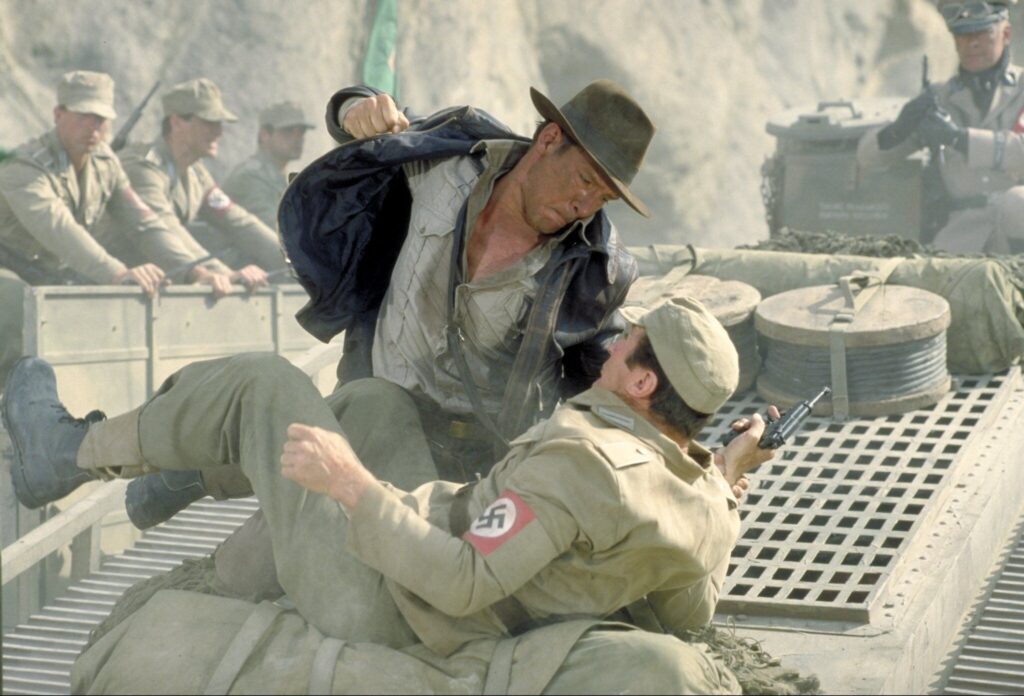
Making the world a better place.
Since Indiana Jones and the Last Crusade primarily had the captive audience of nine-year-old boys in mind, most of the film plays out in a non-stop series of action set pieces designed to see how many times Indy can defy gravity and what modes of transportation he can successfully pilot out of peril with skilled Nazi military expertise hot on his trail. From a foot chase-on-top-of-circus-train antics to swimming in petroleum-soaked flaming-sewer-water rat chases, boat chases, motorcycle chases to fascist leader autographs, airship hijacking, defenestration, airplane dogfights, car chases, horseback riding with monster experimental military tank chases to biblical booby traps, full-body-disintegration, and mystical rule-breaking floor collapse with bottomless pits, Indiana Jones and the Last Crusade is a kid’s back yard sleepover adventure. You know, the fun stuff of imagination long before consumer-grade meat-smokers, a la carte streaming services, smart phones, and Call of Duty filled the voids in our acceptance-deprived hearts.
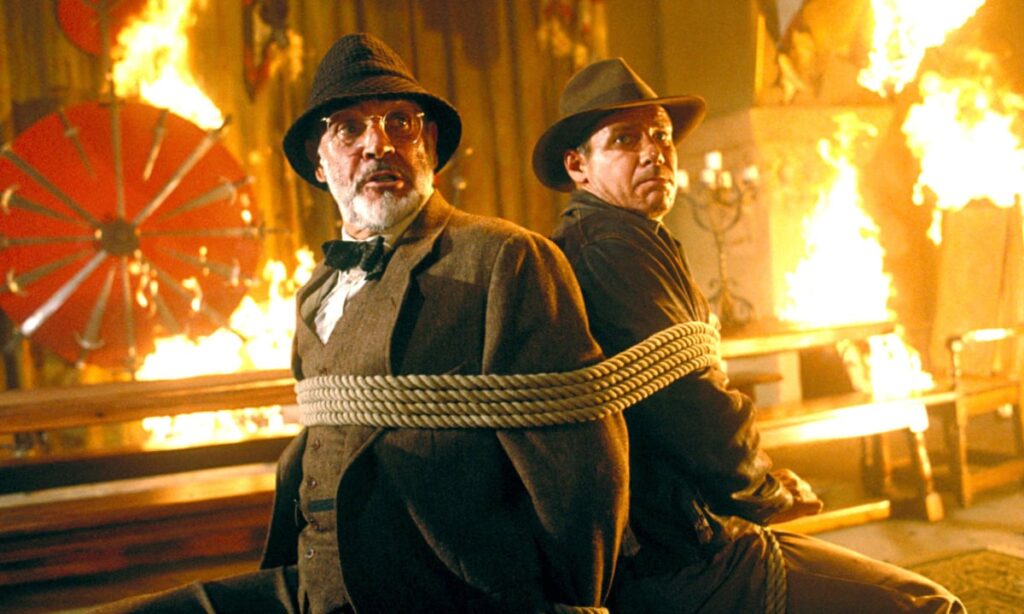
Father and son bonding.
The incessant cram of spirited action leaves but a modicum of time for meaningful narrative, but what remains captures the relatable essence of the frustrated father/son bond. Indy’s father Henry Jones, delightfully portrayed by the legendary Sean Connery, has spent his entire life obsessing over the search for the Holy Grail, leaving Indy in the shadow of his passions. At long last, right when Professor Jones is on the cusp of discovering where to begin searching for the Grail, the Nazis come knocking, leaving him to enlist the aid of his slightly estranged son to pick up the slack—which is precisely when slightly estranged sons are needed the most. And when our heroes aren’t on the run, the endless stream of chases is knitted together with moments of enjoyable bickering between Indy and his dad that all-too-accurately convey how we feel about our own dads breathing down our necks our whole lives.
But in the spirit of the the film’s driving premise, the timeless bond of The Father and The Son—as in God and Jesus Christ—is reflected in the relationship Indy has with his own dad; Professor Jones being emblematic of God, and Indy, in a less-than-crucified-but-sacrificial-nonetheless-way being Christ. Our introduction to Indy’s dad reveals him translating ancient Hebrew text in his Grail diary. This feels symbolic of God writing the Bible which was eventually translated into Greek and then into that pesky King James Version. In a very God-like way, Professor Jones’s face is not seen, and remains out of frame for his royal, almost Holy introduction, and for all intents and purposes, the Grail Diary is the Jones family Bible. After an exciting foot chase, young Indy (coincidentally portrayed by the late River Phoenix who played one of Harrison Ford’s sons in The Mosquito Coast) bursts into his dad’s study with news of his latest discovery. Professor Jones, not to be bothered in the midst of his Grail-related pursuits, instructs Indy to curb his enthusiasm and to count to twenty…in Greek—conveniently the same language as one of the earliest translations of the Holy Bible.
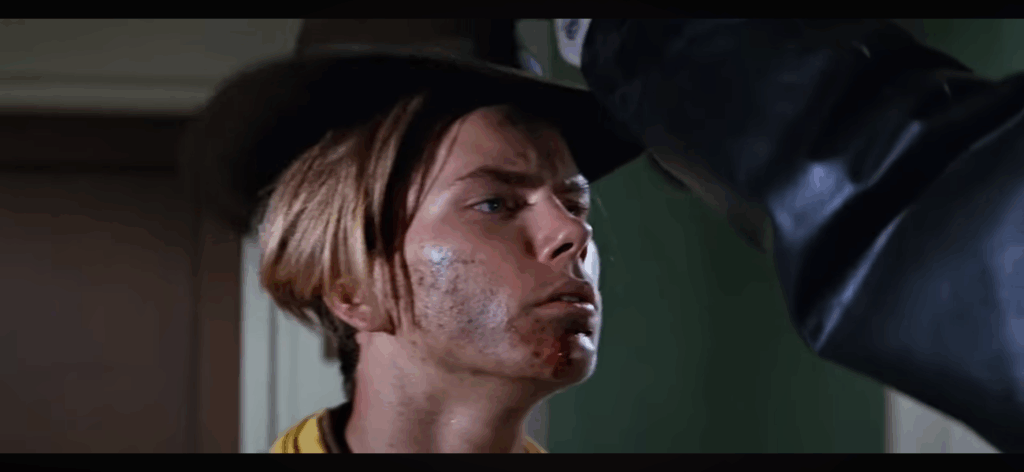
Passing the torch.
This almost fleeting moment introducing us to the discontented relationship between Indy and his father, distracted by its own negligible humor, pays off in a significant and redeeming way near the end of the film right before Indy’s Nazi girlfriend (don’t worry, they break up when he finds out) falls into a bottomless pit but after Indy’s discovery of the Grail literally and figuratively saves his father’s life not unlike the way the teachings of Christ leavened God’s Old Testament brand of barbarity. Indy is figurative of Christ’s role as a mitigation of God’s historical ferocity.
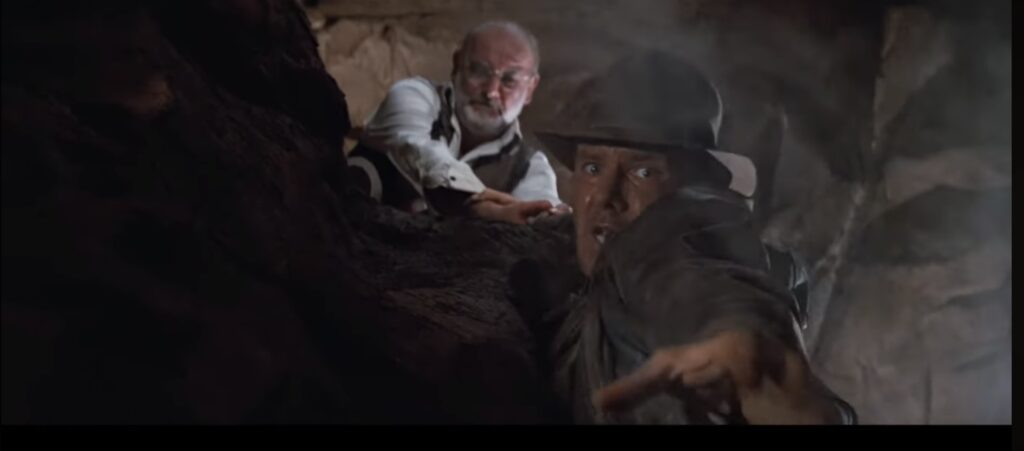
“Indiana. . . Indiana. . .”
In a refreshing take on the traditional themes of Christian sacrifice, Indy, as a Christ figure, is not asked to give up his life in the name of others, but rather, and in a more biblically accurate way, indirectly becomes sacrificial when his father mails him the Grail diary to deter the Nazis’ nefarious designs. This reflects Christ shouldering the sins of mankind at the behest of his Father. “Didn’t any of you guys ever go to Sunday school?”
The first half of the film stages a terrific archeological mystery with one of the world’s most exalted relics at its heart, however, once Indy and his father at long last reunite, all bets are off, and the antics ensue becoming the movie’s driving force, giving way almost completely to high adventure. It’s never not fun, but the film’s logic becomes flimsy and falls to the dynamic performance powerhouses of Harrison Ford and Sean Connery becoming an overt showcase for action and charisma (or “rizz” for all the Gen Z types who still read). Important locations become all too accessible—Germany suddenly becomes extremely close to the Middle East—and Indy’s arrival in Berlin to a Nazi book burning is less about conveniently locating the plot-critical, diary-toting Dr. Schneider (Alison Doody), and more about setting up the joke of bumping into the Führer. It’s a total hoot, but it’s overly gratuitous and quite frankly, just lazy storytelling.
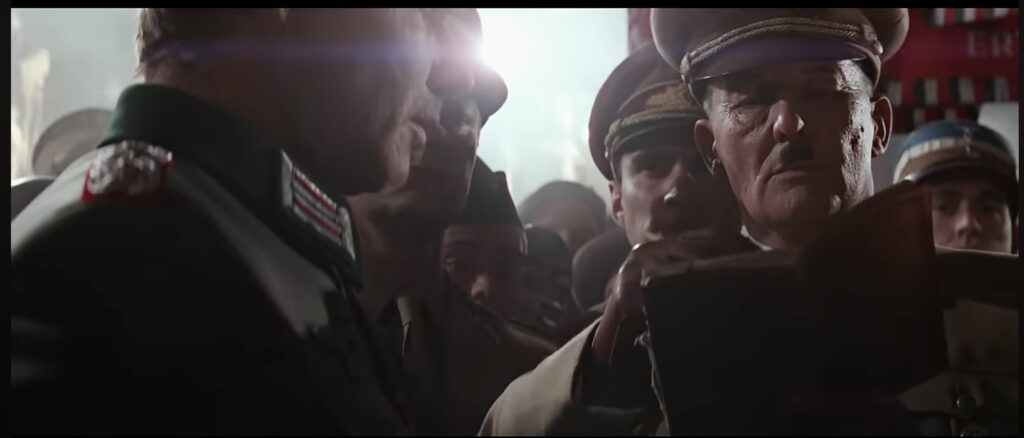
Funny running into you here.
You say, “Lucas, you sure know how to suck the life out of a timeless classic that I’ve loved since I was nine-years-old.” And that’s just it, isn’t it. Indiana Jones and the Last Crusade was the first Indiana Jones movie for a generation and defined the unbridled adventure of youth—myself included. The good news is, Indiana Jones only got better when we eventually saw Raiders of the Lost Ark. The Last Crusade arrived in many of our lives at precisely the right moment, right when we were ripe for adventure, playing outside, chasing each other on bikes, hanging out in treehouses, climbing rope swings and swinging rubber knives, buying overpriced Starfleet combadge personal Holy Grails, and learning that a toy bullwhip from the gift shop at the local theme park isn’t gonna hold your weight on a tree branch all while Dad was shouting at us from the back deck and being up our asses about money and responsibility, and the burdens of the real world and all its storytelling logic were an entire life-age away.
Edited by Olga Tchepikova-Treon
